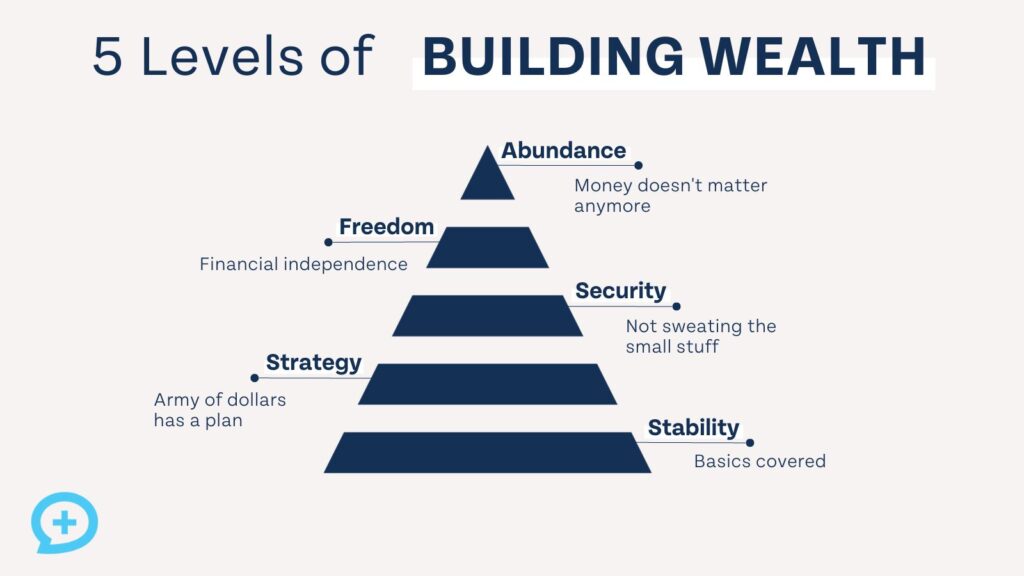The Lie We’re Sold About Wealth
We live in a world that tells us that wealth is about what we have and to become rich depends on how much we have. A mansion with a view. A driveway full of sports cars. Private jets and luxury watches. More, more, more.
But what if that’s completely backward?
True wealth isn’t about what you own. It’s about how you live.
Even Warren Buffett, a man worth over $100 billion, still lives in the same modest house he bought in 1958 for $31,500. When asked why he never upgraded to a mansion, he said, “How would I be happier? I’m already happy. Would a bigger house make me twice as happy? No.”
Science agrees. An 80-year Harvard study found that it’s not money or fame that makes us happy and healthy—it’s good relationships. Time spent with the people we love. Moments we can never buy back.
And yet, many of us spend our days chasing what we think will make us happy, ignoring what actually does.
How Much Is Enough?
Ask yourself: What’s your number?
$1 million?
$5 million?
$10 million?
We all have that number in our heads—the one that says, “Once I reach this, I’ll finally be happy.”
But studies show that once our basic needs are met, extra money adds very little extra happiness. And still, we keep chasing it, hoping the next promotion, the next bonus, the next shiny thing will finally fill the gap.
The Science of True Wealth
Researchers studying the world’s Blue Zones—places where people routinely live past 100—found that long life and happiness have almost nothing to do with money.
In places like Okinawa, Japan, and Ikaria, Greece, people live modest lives with simple homes and modest incomes. What they have in abundance is connection. In Okinawa, they have something called moai—tight-knit circles of lifelong friends who support each other through everything.
When researchers asked these centenarians the secret to a long, happy life, they didn’t mention wealth. They talked about family meals, morning walks with friends, and dancing at community festivals.
The real indicators of lasting happiness and fulfillment?
- Less stress. Fewer possessions = fewer worries.
- More time. Less chasing = more being present.
- Better health. Simple living = better eating, moving, sleeping.
- Financial freedom. Less spending = more saving and security.
- Deeper self-awareness. Less noise = more understanding yourself.
Notice how luxury cars and giant houses aren’t on that list?
So, a simpler life isn’t about deprivation—it’s about gaining the things that matter most. Think of it as addition by subtraction. Strip away the excess and you find clarity, time, peace, and connection.
How to Build True Wealth
| # | Challenge | Action Steps |
|---|---|---|
| 1 | Break the “More Is Better” Habit | – Ask Before You Buy: “Will this add real wealth to my life?” – Measure Purchases in Time: Is it worth 5 hours of your life? – Try a 30-Day Spending Fast: Buy only essentials for a month. – Create a “Maybe Later” List: Revisit impulse buys after 30 days. |
| 2 | Redefine What Wealth Means to You | – List 5 Moments You Felt Truly Wealthy: Reflect on experiences, not money. – Set Wealth Targets Based on Experiences: Plan moments, not purchases – Ask Yourself Daily: “Did I spend my time and money on what truly matters today?” |
| 3 | Invest in Your Relationships | – Plan Weekly Family Dinners: Phone-free, focused on connection. – Reconnect With Old Friends: Send one genuine message a month. – Create a Relationship Budget: Allocate time/resources for relationships. – Join a Community Group: Build shared interests. |
| 4 | Create Weekly Wealth Rituals | – Morning Gratitude: Name 3 things you’re thankful for. – Evening Reflection: Ask, “What was the richest moment today?” – Weekly Nature Time: Spend 30 mins outdoors. – Digital Sunset: Turn off screens 1 hour before bed. |
| 5 | Track Your Wealth Progress | – R.I.C.H. Life Assessment (Monthly): Rate Relationships, Inner Peace, Contribution, Health. – Wealth Journal (Daily): Capture moments of true richness. – Apply the 5-5-5 Wealth Perspective: How will this feel in 5 days, 5 months, 5 years? – Quarterly Reviews: Reflect & adjust. |
| 6 | Master the Art of Savoring | – Be Fully Present for 60 Seconds: Embrace simple joys. – Celebrate Small Wins: Appreciate small victories. – Capture Everyday Moments: Take photos of simple, happy memories. |
| Challenge | Description | Action Steps |
|---|---|---|
| Challenge 1: Breaking the “More” Habit | Before buying something new, ask yourself: Will this add real wealth to my life? If not, skip it. Save for meaningful experiences instead. | ✅ Pause before purchases ✅ Reflect on true value ✅ Redirect savings to experiences that enrich your life |
| Challenge 2: Dealing with Pressure | Others might not understand your choices—and that’s okay. Prioritize your values over external expectations. | ✅ Stand firm in your decisions ✅ Remind yourself why you’re choosing this path ✅ Focus on your long-term vision |
| Challenge 3: Staying Consistent | Old habits can creep back in. Stay intentional. Place reminders where you see them daily. Check in with yourself regularly. | ✅ Use visual reminders (photo, note) ✅ Do a monthly self-check ✅ Ask: Am I chasing true wealth—or getting distracted? |
The Long-Term Benefits of True Wealth
✔️ Deeper happiness that lasts.
✔️ Freedom from comparison—you’re playing a different game now.
✔️ A legacy that matters.
✔️ Peace of mind, today and tomorrow.
Frameworks for Your Wealth Journey
Try these tools to stay on track:
▶️The R.I.C.H. Life Assessment
Rate yourself from 1-10 in these areas:
R: Relationships
I: Inner peace
C: Contribution
H: Health
Start by improving the lowest score.
▶️The 5-5-5 Wealth Perspective
Ask:
- How will I feel about this in 5 days?
- 5 months?
- 5 years?
It helps cut through short-term thinking.

▶️The Weekly Wealth Tracker
Each Sunday, reflect:
- What moment made me feel richest?
- What did I do to invest in relationships?
- Did I spend my time in line with my values?
▶️The SIMPLIFY Framework
S: Select what matters
I: Identify clutter
M: Minimize commitments
P: Prioritize relationships
L: Learn gratitude
I: Integrate mindfulness
F: Focus on experiences
Y: Yield time for yourself
▶️Start Today
Take one small step.
Have dinner with your family.
Watch the sunset without your phone.
Let go of something you don’t need.
And notice how it feels. That feeling? That’s real wealth growing.
Important Points to Remember
- True Wealth Is Freedom and Experience, Not Possessions
Real wealth is having the time and freedom to do what matters most—spending meaningful moments with the people you love, living life on your terms. - Material Wealth Often Leaves You Empty
Many people sacrifice their time chasing things they don’t need. In doing so, they miss out on precious moments with family and friends—moments they can never get back. - Science Confirms That Relationships Matter Most
An 80-year Harvard study found that the key to happiness and long life isn’t money or fame, but close, loving relationships. - Blue Zone Research Reveals the Secret to Longevity
In the world’s longest-living communities—like Okinawa and Sardinia—people attribute their long lives to strong social connections, purpose, and simple living, not wealth. - Simple Living Adds More Than It Takes Away
By clearing out what doesn’t matter, you make space for joy, peace, and fulfillment. Less stress. More time. Better health. Deeper self-awareness. - Small Daily Practices Create Lasting Wealth
A gratitude habit, quiet reflection, time in nature, and unplugging before bed can make you feel rich and fulfilled, no matter your bank balance. - The Art of Savoring Turns Ordinary Into Extraordinary
Fully experiencing life’s simple pleasures—sunsets, laughter, a shared meal—multiplies your feeling of wealth, without costing a dime. - Measure Your Wealth in Moments, Not Money
The true legacy you leave behind won’t be the things you own, but the love, memories, and time you shared with others. - Happiness From Experiences Grows Over Time
Unlike material things, meaningful memories continue to bring joy. They are the dividends of your personal wealth portfolio. - True Wealth Is Created, Not Bought
It comes from how you live each day—how you spend your time, nurture your relationships, and create meaning in your life.
Final Thought
Steve Jobs was worth $10 billion when he died. On his deathbed, he wrote:
“At this moment, lying on my bed, sick and remembering my life, I realize all my recognition and wealth are meaningless in the face of death.”
He realized, too late, that the wealth of memory is more valuable than the memory of wealth.
You don’t have to wait until it’s too late. Building true wealth isn’t about what you earn or buy—it’s about how you live and who you share life with. Start small. Stay consistent. And remember:
“Wealth is the ability to fully experience life.” – Henry David Thoreau
So, start building your true wealth today. Your future self will thank you.
Disclosure: This article does not represent investment advice. The content and materials featured on this page are for educational purposes only.
Related:










